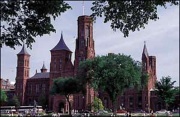Difference between revisions of "Seneca Red sandstone"
Jump to navigation
Jump to search
m (Text replace - "== Authority ==" to "== Sources Checked for Data in Record ==") |
|||
| Line 1: | Line 1: | ||
| − | [[File:Smith.Inst._MainBldg_Castle.jpg|thumb|Smithsonian Institution, Main Building | + | [[File:Smith.Inst._MainBldg_Castle.jpg|thumb|Smithsonian Institution, Main Building, Washington DC]] |
| − | |||
| − | Washington DC]] | ||
== Description == | == Description == | ||
| Line 10: | Line 8: | ||
red Seneca sandstone | red Seneca sandstone | ||
| − | == | + | ==Resources and Citations== |
| − | |||
* Frank A. Lent, ''Trade names and Descriptions of Marbles, Limestones, Sandstones, Granites and Other Building Stones Quarried in the United States Canada and other Countries.'', Stone Publishing Co, New York, 1925 | * Frank A. Lent, ''Trade names and Descriptions of Marbles, Limestones, Sandstones, Granites and Other Building Stones Quarried in the United States Canada and other Countries.'', Stone Publishing Co, New York, 1925 | ||
Latest revision as of 13:03, 30 May 2022
Description
A fine-grain sandstone quarried along Seneca Creek in Montgomery County, Maryland. The color of Seneca Red sandstone varied from a light reddish brown to cinnamon to a deep purplish brown. It darkens and hardens on exposure to air. From 1845-1875, it was extensively used for buildings in Washington DC, including the original Smithsonian Institution building. The quarries closed about 1890.
Synonyms and Related Terms
red Seneca sandstone
Resources and Citations
- Frank A. Lent, Trade names and Descriptions of Marbles, Limestones, Sandstones, Granites and Other Building Stones Quarried in the United States Canada and other Countries., Stone Publishing Co, New York, 1925
